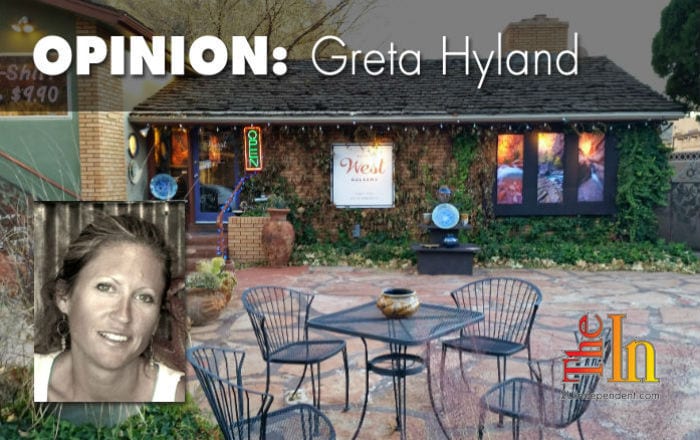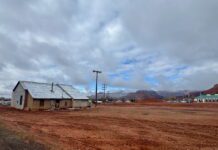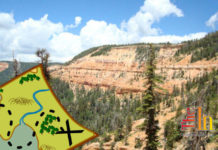
Written by Greta Hyland
A few weeks ago, my husband and I decided to spend a night in Springdale for a backcountry hike in Zion rather than make the early morning and late night commutes to and from St. George. We booked a room at the La Quinta. I don’t remember why we chose that hotel over our usual choice of the Historic Pioneer Lodge; perhaps it was the price. Either way, when we drove into the hotel parking lot, I marveled at how huge it was and questioned how much it must have cost to build it. The La Quinta is like a subdivision in Springdale.
As we unloaded the car, my husband remarked that it was odd that the town shutdown a Subway franchise because of an ordinance enacted as part of their general plan to keep a “small town” feel in Springdale but allowed several new franchise hotels to be built. I agreed. Surely the local motels, hotels, and B&Bs don’t appreciate the new competition. And I think the mega hotels would ruin the small town feel more than a franchise sandwich shop.
The Independent ran a Letter to the Editor by a local Springdale resident who raised questions about how Utah advertises tourism but doesn’t put the revenue into the towns most impacted by tourism. She talked about traffic, pollution, infrastructure problems, poor staffing, underpaid workers, and the overall impact that millions of visitors have when they come to Zion National Park. It was a great article and one that shared a view not often heard. Businesses surely love the revenue. So do the cities and states. Even environmentalists, who suggest that it’s a better alternative to industry, turn a blind eye to tourism and recreation impact, but the negative impacts on the local population and the land cannot be ignored.
When I read the article about Springdale denying the application for a Subway sandwich shop, I kind of applauded the town for keeping it “local.” But how does squeezing in as many mega hotels into the town as you can abide by that ordinance? It seems to me that, by allowing all of those new hotels, the city of Springdale has violated its own ordinance.
According to an article in The Independent about the lawsuit filed against Springdale by the Subway owners, the owners did not fill out their application correctly and provided “false and misleading information during the application process.” So clearly, there was more to denying the Subway than just keeping a small-town feel to Springdale, but the seeming hypocrisy here is hard to miss.
While I am sure that all the new chain hotels filled out their applications correctly and honestly, I can’t help thinking that they were more appealing due to the revenue they would bring in. But this leads me back to the local resident’s angst about a lack of funding for infrastructure and pay: is the city not as culpable in that as the state? How much revenue does the city make from hotels? Shouldn’t that money be cycling back to the city and residents who are bearing the real brunt of tourism?
It seems to me that the town ordinance was a good move. It implies that quality of life is as important as revenue streams, but when that revenue is not used for roads, sewage, and decent pay, it makes a mockery of the public trust those officials have been given by people who live, work, and volunteer there.
Fixing problems on the local level is the best way to get necessary changes implemented. It seems to me that the town of Springdale–and those in office there–are the ones who should be working to make sure that the locals are taken care of first, not the tourists. If there is a need for wider roads and better infrastructure, the city should be petitioning the state for it. If Zion does not have the funding or staff to handle the deluge of visitors, all of us should be writing our Congressional representatives and demanding that they stop playing politics with our national parks and fund them appropriately. And if they slide riders into unrelated legislation, holding our parks and lands hostage by demanding budget cuts, we should vote them out of office.
What happens on the state and national level is felt on the local level, which is why it must start there. Do you remember what happened to the goose that laid the golden egg? It died. You must feed the goose. Tourism dollars are great, but we need to make sure that we are not getting them by taking advantage of the local people who live here.
Greta Hyland has a Masters degree in Environmental Policy & Management. She is a regular contributor to the Utah Adventure Journal and she writes regularly on her blog about environmental policy issues affecting the southwest, as well as personal narratives about outdoor recreation and simple living. Her blog can be found at www.thesouthwestjournal.wordpress.com A Utah native, Greta is a consummate desert rat and loves exploring the southwest. She can be reached at [email protected]




